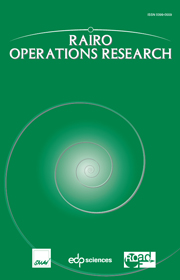Article contents
Evaluating flexible solutions in single machine scheduling via objective function maximization: the study of computational complexity
Published online by Cambridge University Press: 15 June 2007
Abstract
We study a deterministic problem of evaluating the worst case performance of flexible solutions in the single machine scheduling. A flexible solution is a set of schedules following a given structure determined by a partial order of jobs and a type of the schedules. In this paper, the schedules of active and non-delay type are considered. A flexible solution can be used on-line to absorb the impact of data disturbances related to, for example, job arrival, tool availability or machine breakdowns. The performance of a flexible solution includes the best case and the worst case performances. The best case performance is an ideal performance that can be achieved only if the on-line conditions allow to implement the best schedule of the set of schedules characterizing the flexible solution. In contrast, the worst case performance indicates how poorly the flexible solution may perform when following the given structure in the on-line circumstances. The best-case and the worst-case performances are usually evaluated by the minimum and maximum values of the considered objective function, respectively. We present algorithmic and computational complexity results for some maximization scheduling problems. In these problems, the jobs to be scheduled have different release dates and precedence constraints may be given on the set of jobs.
Keywords
- Type
- Research Article
- Information
- Copyright
- © EDP Sciences, ROADEF, SMAI, 2007
References
- 8
- Cited by


